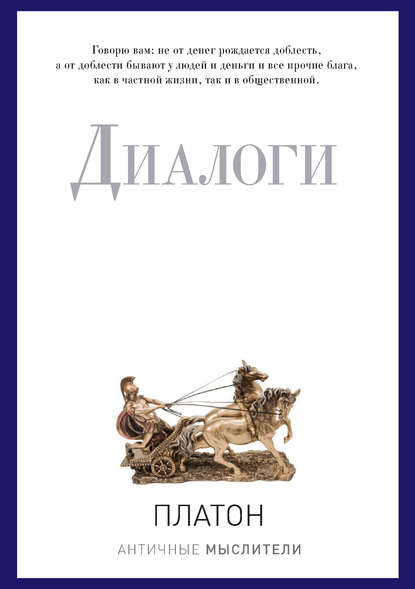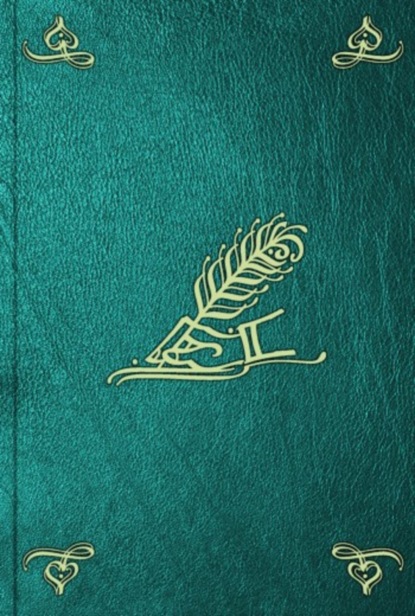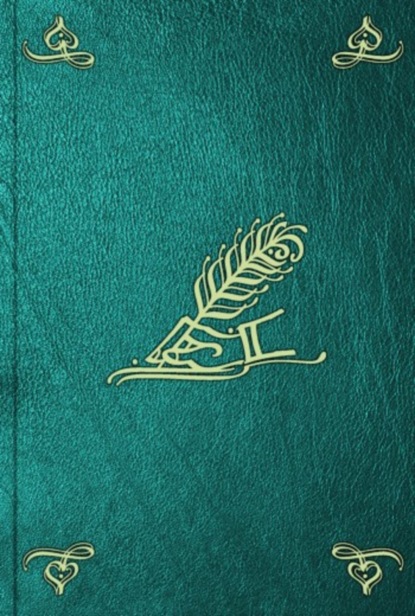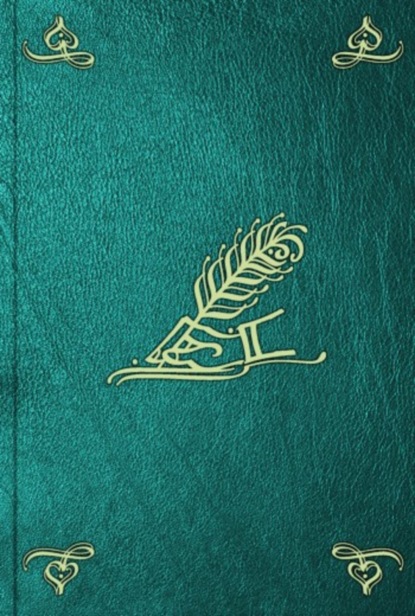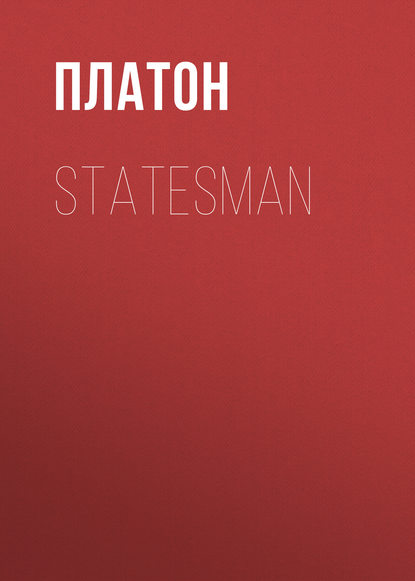 Полная версия
Полная версияПолная версия:
Платон Laws
- + Увеличить шрифт
- - Уменьшить шрифт

Plato
Laws
INTRODUCTION AND ANALYSIS
The genuineness of the Laws is sufficiently proved (1) by more than twenty citations of them in the writings of Aristotle, who was residing at Athens during the last twenty years of the life of Plato, and who, having left it after his death (B.C. 347), returned thither twelve years later (B.C. 335); (2) by the allusion of Isocrates
(Oratio ad Philippum missa, p.84: To men tais paneguresin enochlein kai pros apantas legein tous sunprechontas en autais pros oudena legein estin, all omoios oi toioutoi ton logon (sc. speeches in the assembly) akuroi tugchanousin ontes tois nomois kai tais politeiais tais upo ton sophiston gegrammenais.) – writing 346 B.C., a year after the death of Plato, and probably not more than three or four years after the composition of the Laws – who speaks of the Laws and Republics written by philosophers (upo ton sophiston); (3) by the reference (Athen.) of the comic poet Alexis, a younger contemporary of Plato (fl. B.C 356-306), to the enactment about prices, which occurs in Laws xi., viz that the same goods should not be offered at two prices on the same day
(Ou gegone kreitton nomothetes tou plousiou Aristonikou tithesi gar nuni nomon, ton ichthuopolon ostis an polon tini ichthun upotimesas apodot elattonos es eipe times, eis to desmoterion euthus apagesthai touton, ina dedoikotes tes axias agaposin, e tes esperas saprous apantas apopherosin oikade.
Meineke, Frag. Com. Graec.); (4) by the unanimous voice of later antiquity and the absence of any suspicion among ancient writers worth speaking of to the contrary; for it is not said of Philippus of Opus that he composed any part of the Laws, but only that he copied them out of the waxen tablets, and was thought by some to have written the Epinomis (Diog. Laert.) That the longest and one of the best writings bearing the name of Plato should be a forgery, even if its genuineness were unsupported by external testimony, would be a singular phenomenon in ancient literature; and although the critical worth of the consensus of late writers is generally not to be compared with the express testimony of contemporaries, yet a somewhat greater value may be attributed to their consent in the present instance, because the admission of the Laws is combined with doubts about the Epinomis, a spurious writing, which is a kind of epilogue to the larger work probably of a much later date. This shows that the reception of the Laws was not altogether undiscriminating.
The suspicion which has attached to the Laws of Plato in the judgment of some modern writers appears to rest partly (1) on differences in the style and form of the work, and (2) on differences of thought and opinion which they observe in them. Their suspicion is increased by the fact that these differences are accompanied by resemblances as striking to passages in other Platonic writings. They are sensible of a want of point in the dialogue and a general inferiority in the ideas, plan, manners, and style. They miss the poetical flow, the dramatic verisimilitude, the life and variety of the characters, the dialectic subtlety, the Attic purity, the luminous order, the exquisite urbanity; instead of which they find tautology, obscurity, self-sufficiency, sermonizing, rhetorical declamation, pedantry, egotism, uncouth forms of sentences, and peculiarities in the use of words and idioms. They are unable to discover any unity in the patched, irregular structure. The speculative element both in government and education is superseded by a narrow economical or religious vein. The grace and cheerfulness of Athenian life have disappeared; and a spirit of moroseness and religious intolerance has taken their place. The charm of youth is no longer there; the mannerism of age makes itself unpleasantly felt. The connection is often imperfect; and there is a want of arrangement, exhibited especially in the enumeration of the laws towards the end of the work. The Laws are full of flaws and repetitions. The Greek is in places very ungrammatical and intractable. A cynical levity is displayed in some passages, and a tone of disappointment and lamentation over human things in others. The critics seem also to observe in them bad imitations of thoughts which are better expressed in Plato's other writings. Lastly, they wonder how the mind which conceived the Republic could have left the Critias, Hermocrates, and Philosophus incomplete or unwritten, and have devoted the last years of life to the Laws.
The questions which have been thus indirectly suggested may be considered by us under five or six heads: I, the characters; II, the plan; III, the style; IV, the imitations of other writings of Plato; V; the more general relation of the Laws to the Republic and the other dialogues; and VI, to the existing Athenian and Spartan states.
I. Already in the Philebus the distinctive character of Socrates has disappeared; and in the Timaeus, Sophist, and Statesman his function of chief speaker is handed over to the Pythagorean philosopher Timaeus, and to the Eleatic Stranger, at whose feet he sits, and is silent. More and more Plato seems to have felt in his later writings that the character and method of Socrates were no longer suited to be the vehicle of his own philosophy. He is no longer interrogative but dogmatic; not 'a hesitating enquirer,' but one who speaks with the authority of a legislator. Even in the Republic we have seen that the argument which is carried on by Socrates in the old style with Thrasymachus in the first book, soon passes into the form of exposition. In the Laws he is nowhere mentioned. Yet so completely in the tradition of antiquity is Socrates identified with Plato, that in the criticism of the Laws which we find in the so-called Politics of Aristotle he is supposed by the writer still to be playing his part of the chief speaker (compare Pol.).
The Laws are discussed by three representatives of Athens, Crete, and Sparta. The Athenian, as might be expected, is the protagonist or chief speaker, while the second place is assigned to the Cretan, who, as one of the leaders of a new colony, has a special interest in the conversation. At least four-fifths of the answers are put into his mouth. The Spartan is every inch a soldier, a man of few words himself, better at deeds than words. The Athenian talks to the two others, although they are his equals in age, in the style of a master discoursing to his scholars; he frequently praises himself; he entertains a very poor opinion of the understanding of his companions. Certainly the boastfulness and rudeness of the Laws is the reverse of the refined irony and courtesy which characterize the earlier dialogues. We are no longer in such good company as in the Phaedrus and Symposium. Manners are lost sight of in the earnestness of the speakers, and dogmatic assertions take the place of poetical fancies.
The scene is laid in Crete, and the conversation is held in the course of a walk from Cnosus to the cave and temple of Zeus, which takes place on one of the longest and hottest days of the year. The companions start at dawn, and arrive at the point in their conversation which terminates the fourth book, about noon. The God to whose temple they are going is the lawgiver of Crete, and this may be supposed to be the very cave at which he gave his oracles to Minos. But the externals of the scene, which are briefly and inartistically described, soon disappear, and we plunge abruptly into the subject of the dialogue. We are reminded by contrast of the higher art of the Phaedrus, in which the summer's day, and the cool stream, and the chirping of the grasshoppers, and the fragrance of the agnus castus, and the legends of the place are present to the imagination throughout the discourse.
The typical Athenian apologizes for the tendency of his countrymen 'to spin a long discussion out of slender materials,' and in a similar spirit the Lacedaemonian Megillus apologizes for the Spartan brevity (compare Thucydid.), acknowledging at the same time that there may be occasions when long discourses are necessary. The family of Megillus is the proxenus of Athens at Sparta; and he pays a beautiful compliment to the Athenian, significant of the character of the work, which, though borrowing many elements from Sparta, is also pervaded by an Athenian spirit. A good Athenian, he says, is more than ordinarily good, because he is inspired by nature and not manufactured by law. The love of listening which is attributed to the Timocrat in the Republic is also exhibited in him. The Athenian on his side has a pleasure in speaking to the Lacedaemonian of the struggle in which their ancestors were jointly engaged against the Persians. A connexion with Athens is likewise intimated by the Cretan Cleinias. He is the relative of Epimenides, whom, by an anachronism of a century, – perhaps arising as Zeller suggests (Plat. Stud.) out of a confusion of the visit of Epimenides and Diotima (Symp.), – he describes as coming to Athens, not after the attempt of Cylon, but ten years before the Persian war. The Cretan and Lacedaemonian hardly contribute at all to the argument of which the Athenian is the expounder; they only supply information when asked about the institutions of their respective countries. A kind of simplicity or stupidity is ascribed to them. At first, they are dissatisfied with the free criticisms which the Athenian passes upon the laws of Minos and Lycurgus, but they acquiesce in his greater experience and knowledge of the world. They admit that there can be no objection to the enquiry; for in the spirit of the legislator himself, they are discussing his laws when there are no young men present to listen. They are unwilling to allow that the Spartan and Cretan lawgivers can have been mistaken in honouring courage as the first part of virtue, and are puzzled at hearing for the first time that 'Goods are only evil to the evil.' Several times they are on the point of quarrelling, and by an effort learn to restrain their natural feeling (compare Shakespeare, Henry V, act iii. sc. 2). In Book vii., the Lacedaemonian expresses a momentary irritation at the accusation which the Athenian brings against the Spartan institutions, of encouraging licentiousness in their women, but he is reminded by the Cretan that the permission to criticize them freely has been given, and cannot be retracted. His only criterion of truth is the authority of the Spartan lawgiver; he is 'interested,' in the novel speculations of the Athenian, but inclines to prefer the ordinances of Lycurgus.
The three interlocutors all of them speak in the character of old men, which forms a pleasant bond of union between them. They have the feelings of old age about youth, about the state, about human things in general. Nothing in life seems to be of much importance to them; they are spectators rather than actors, and men in general appear to the Athenian speaker to be the playthings of the Gods and of circumstances. Still they have a fatherly care of the young, and are deeply impressed by sentiments of religion. They would give confidence to the aged by an increasing use of wine, which, as they get older, is to unloose their tongues and make them sing. The prospect of the existence of the soul after death is constantly present to them; though they can hardly be said to have the cheerful hope and resignation which animates Socrates in the Phaedo or Cephalus in the Republic. Plato appears to be expressing his own feelings in remarks of this sort. For at the time of writing the first book of the Laws he was at least seventy-four years of age, if we suppose him to allude to the victory of the Syracusans under Dionysius the Younger over the Locrians, which occurred in the year 356. Such a sadness was the natural effect of declining years and failing powers, which make men ask, 'After all, what profit is there in life?' They feel that their work is beginning to be over, and are ready to say, 'All the world is a stage;' or, in the actual words of Plato, 'Let us play as good plays as we can,' though 'we must be sometimes serious, which is not agreeable, but necessary.' These are feelings which have crossed the minds of reflective persons in all ages, and there is no reason to connect the Laws any more than other parts of Plato's writings with the very uncertain narrative of his life, or to imagine that this melancholy tone is attributable to disappointment at having failed to convert a Sicilian tyrant into a philosopher.
II. The plan of the Laws is more irregular and has less connexion than any other of the writings of Plato. As Aristotle says in the Politics, 'The greater part consists of laws'; in Books v, vi, xi, xii the dialogue almost entirely disappears. Large portions of them are rather the materials for a work than a finished composition which may rank with the other Platonic dialogues. To use his own image, 'Some stones are regularly inserted in the building; others are lying on the ground ready for use.' There is probably truth in the tradition that the Laws were not published until after the death of Plato. We can easily believe that he has left imperfections, which would have been removed if he had lived a few years longer. The arrangement might have been improved; the connexion of the argument might have been made plainer, and the sentences more accurately framed. Something also may be attributed to the feebleness of old age. Even a rough sketch of the Phaedrus or Symposium would have had a very different look. There is, however, an interest in possessing one writing of Plato which is in the process of creation.
We must endeavour to find a thread of order which will carry us through this comparative disorder. The first four books are described by Plato himself as the preface or preamble. Having arrived at the conclusion that each law should have a preamble, the lucky thought occurs to him at the end of the fourth book that the preceding discourse is the preamble of the whole. This preamble or introduction may be abridged as follows: —
The institutions of Sparta and Crete are admitted by the Lacedaemonian and Cretan to have one aim only: they were intended by the legislator to inspire courage in war. To this the Athenian objects that the true lawgiver should frame his laws with a view to all the virtues and not to one only. Better is he who has temperance as well as courage, than he who has courage only; better is he who is faithful in civil broils, than he who is a good soldier only. Better, too, is peace than war; the reconciliation than the defeat of an enemy. And he who would attain all virtue should be trained amid pleasures as well as pains. Hence there should be convivial intercourse among the citizens, and a man's temperance should be tested in his cups, as we test his courage amid dangers. He should have a fear of the right sort, as well as a courage of the right sort.
At the beginning of the second book the subject of pleasure leads to education, which in the early years of life is wholly a discipline imparted by the means of pleasure and pain. The discipline of pleasure is implanted chiefly by the practice of the song and the dance. Of these the forms should be fixed, and not allowed to depend on the fickle breath of the multitude. There will be choruses of boys, girls, and grown-up persons, and all will be heard repeating the same strain, that 'virtue is happiness.' One of them will give the law to the rest; this will be the chorus of aged minstrels, who will sing the most beautiful and the most useful of songs. They will require a little wine, to mellow the austerity of age, and make them amenable to the laws.
After having laid down as the first principle of politics, that peace, and not war, is the true aim of the legislator, and briefly discussed music and festive intercourse, at the commencement of the third book Plato makes a digression, in which he speaks of the origin of society. He describes, first of all, the family; secondly, the patriarchal stage, which is an aggregation of families; thirdly, the founding of regular cities, like Ilium; fourthly, the establishment of a military and political system, like that of Sparta, with which he identifies Argos and Messene, dating from the return of the Heraclidae. But the aims of states should be good, or else, like the prayer of Theseus, they may be ruinous to themselves. This was the case in two out of three of the Heracleid kingdoms. They did not understand that the powers in a state should be balanced. The balance of powers saved Sparta, while the excess of tyranny in Persia and the excess of liberty at Athens have been the ruin of both…This discourse on politics is suddenly discovered to have an immediate practical use; for Cleinias the Cretan is about to give laws to a new colony.
At the beginning of the fourth book, after enquiring into the circumstances and situation of the colony, the Athenian proceeds to make further reflections. Chance, and God, and the skill of the legislator, all co-operate in the formation of states. And the most favourable condition for the foundation of a new one is when the government is in the hands of a virtuous tyrant who has the good fortune to be the contemporary of a great legislator. But a virtuous tyrant is a contradiction in terms; we can at best only hope to have magistrates who are the servants of reason and the law. This leads to the enquiry, what is to be the polity of our new state. And the answer is, that we are to fear God, and honour our parents, and to cultivate virtue and justice; these are to be our first principles. Laws must be definite, and we should create in the citizens a predisposition to obey them. The legislator will teach as well as command; and with this view he will prefix preambles to his principal laws.
The fifth book commences in a sort of dithyramb with another and higher preamble about the honour due to the soul, whence are deduced the duties of a man to his parents and his friends, to the suppliant and stranger. He should be true and just, free from envy and excess of all sorts, forgiving to crimes which are not incurable and are partly involuntary; and he should have a true taste. The noblest life has the greatest pleasures and the fewest pains…Having finished the preamble, and touched on some other preliminary considerations, we proceed to the Laws, beginning with the constitution of the state. This is not the best or ideal state, having all things common, but only the second-best, in which the land and houses are to be distributed among 5040 citizens divided into four classes. There is to be no gold or silver among them, and they are to have moderate wealth, and to respect number and numerical order in all things.
In the first part of the sixth book, Plato completes his sketch of the constitution by the appointment of officers. He explains the manner in which guardians of the law, generals, priests, wardens of town and country, ministers of education, and other magistrates are to be appointed; and also in what way courts of appeal are to be constituted, and omissions in the law to be supplied. Next – and at this point the Laws strictly speaking begin – there follow enactments respecting marriage and the procreation of children, respecting property in slaves as well as of other kinds, respecting houses, married life, common tables for men and women. The question of age in marriage suggests the consideration of a similar question about the time for holding offices, and for military service, which had been previously omitted.
Resuming the order of the discussion, which was indicated in the previous book, from marriage and birth we proceed to education in the seventh book. Education is to begin at or rather before birth; to be continued for a time by mothers and nurses under the supervision of the state; finally, to comprehend music and gymnastics. Under music is included reading, writing, playing on the lyre, arithmetic, geometry, and a knowledge of astronomy sufficient to preserve the minds of the citizens from impiety in after-life. Gymnastics are to be practised chiefly with a view to their use in war. The discussion of education, which was lightly touched upon in Book ii, is here completed.
The eighth book contains regulations for civil life, beginning with festivals, games, and contests, military exercises and the like. On such occasions Plato seems to see young men and maidens meeting together, and hence he is led into discussing the relations of the sexes, the evil consequences which arise out of the indulgence of the passions, and the remedies for them. Then he proceeds to speak of agriculture, of arts and trades, of buying and selling, and of foreign commerce.
The remaining books of the Laws, ix-xii, are chiefly concerned with criminal offences. In the first class are placed offences against the Gods, especially sacrilege or robbery of temples: next follow offences against the state, – conspiracy, treason, theft. The mention of thefts suggests a distinction between voluntary and involuntary, curable and incurable offences. Proceeding to the greater crime of homicide, Plato distinguishes between mere homicide, manslaughter, which is partly voluntary and partly involuntary, and murder, which arises from avarice, ambition, fear. He also enumerates murders by kindred, murders by slaves, wounds with or without intent to kill, wounds inflicted in anger, crimes of or against slaves, insults to parents. To these, various modes of purification or degrees of punishment are assigned, and the terrors of another world are also invoked against them.
At the beginning of Book x, all acts of violence, including sacrilege, are summed up in a single law. The law is preceded by an admonition, in which the offenders are informed that no one ever did an unholy act or said an unlawful word while he retained his belief in the existence of the Gods; but either he denied their existence, or he believed that they took no care of man, or that they might be turned from their course by sacrifices and prayers. The remainder of the book is devoted to the refutation of these three classes of unbelievers, and concludes with the means to be taken for their reformation, and the announcement of their punishments if they continue obstinate and impenitent.
The eleventh book is taken up with laws and with admonitions relating to individuals, which follow one another without any exact order. There are laws concerning deposits and the finding of treasure; concerning slaves and freedmen; concerning retail trade, bequests, divorces, enchantments, poisonings, magical arts, and the like. In the twelfth book the same subjects are continued. Laws are passed concerning violations of military discipline, concerning the high office of the examiners and their burial; concerning oaths and the violation of them, and the punishments of those who neglect their duties as citizens. Foreign travel is then discussed, and the permission to be accorded to citizens of journeying in foreign parts; the strangers who may come to visit the city are also spoken of, and the manner in which they are to be received. Laws are added respecting sureties, searches for property, right of possession by prescription, abduction of witnesses, theatrical competition, waging of private warfare, and bribery in offices. Rules are laid down respecting taxation, respecting economy in sacred rites, respecting judges, their duties and sentences, and respecting sepulchral places and ceremonies. Here the Laws end. Lastly, a Nocturnal Council is instituted for the preservation of the state, consisting of older and younger members, who are to exhibit in their lives that virtue which is the basis of the state, to know the one in many, and to be educated in divine and every other kind of knowledge which will enable them to fulfil their office.
III. The style of the Laws differs in several important respects from that of the other dialogues of Plato: (1) in the want of character, power, and lively illustration; (2) in the frequency of mannerisms (compare Introduction to the Philebus); (3) in the form and rhythm of the sentences; (4) in the use of words. On the other hand, there are many passages (5) which are characterized by a sort of ethical grandeur; and (6) in which, perhaps, a greater insight into human nature, and a greater reach of practical wisdom is shown, than in any other of Plato's writings.
1. The discourse of the three old men is described by themselves as an old man's game of play. Yet there is little of the liveliness of a game in their mode of treating the subject. They do not throw the ball to and fro, but two out of the three are listeners to the third, who is constantly asserting his superior wisdom and opportunities of knowledge, and apologizing (not without reason) for his own want of clearness of speech. He will 'carry them over the stream;' he will answer for them when the argument is beyond their comprehension; he is afraid of their ignorance of mathematics, and thinks that gymnastic is likely to be more intelligible to them; – he has repeated his words several times, and yet they cannot understand him. The subject did not properly take the form of dialogue, and also the literary vigour of Plato had passed away. The old men speak as they might be expected to speak, and in this there is a touch of dramatic truth. Plato has given the Laws that form or want of form which indicates the failure of natural power. There is no regular plan – none of that consciousness of what has preceded and what is to follow, which makes a perfect style, – but there are several attempts at a plan; the argument is 'pulled up,' and frequent explanations are offered why a particular topic was introduced.


